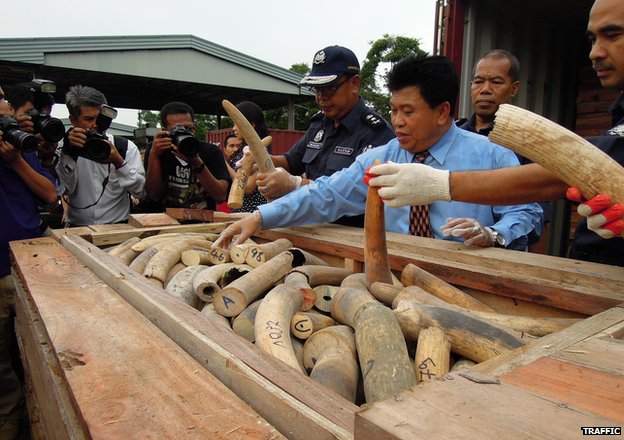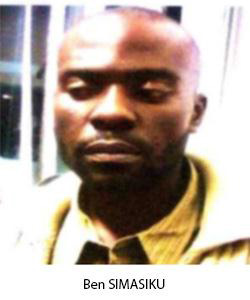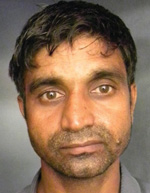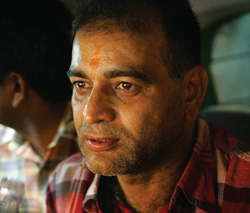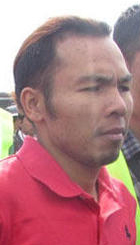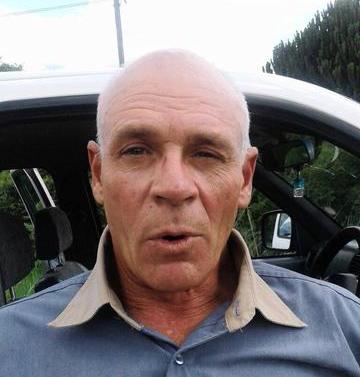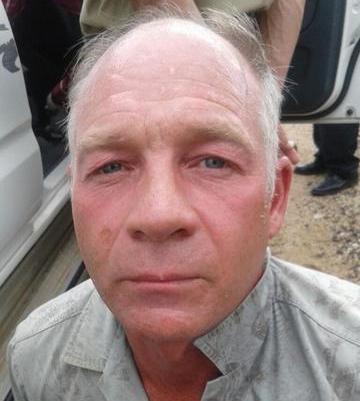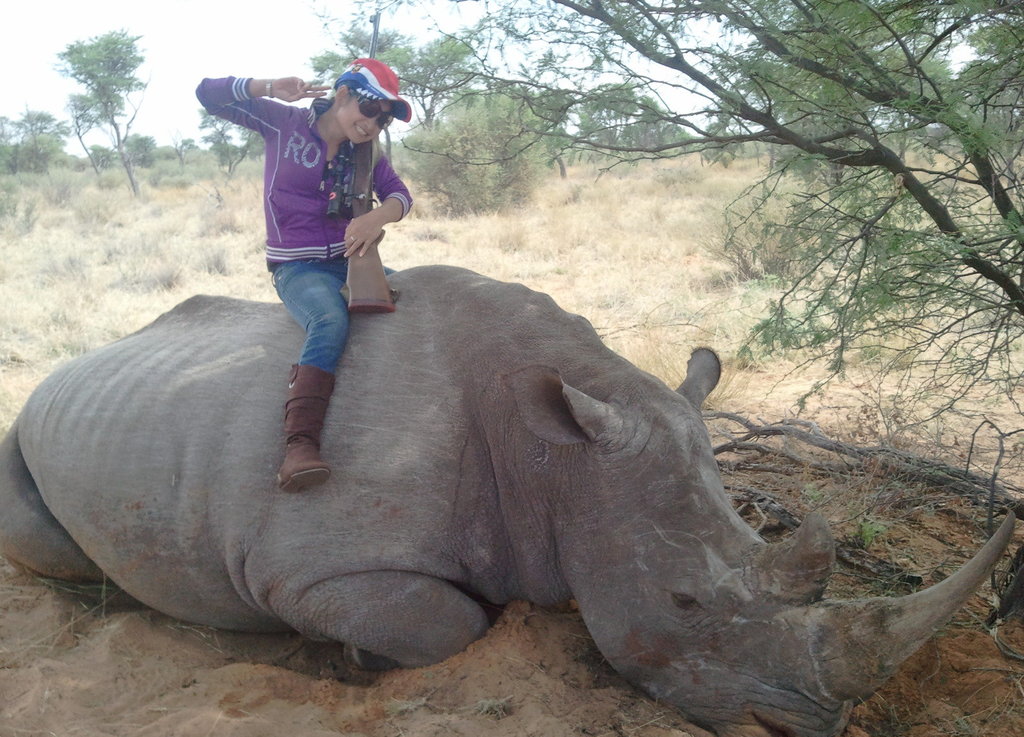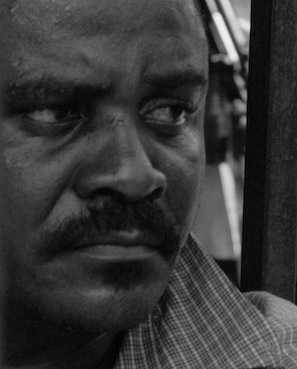
Organized Crime & Criminal Syndicates
Prior to the international ivory trade ban in 1989 the poachers of elephants, rhinoceroses, tigers, and other animals relied, and continue to rely, on organized criminal syndicates to skirt local laws banning hunting of protected wildlife and international laws that were created to regulate the legal wildlife trade. Today these networks are still necessary to move and distribute illicit products, and even live animals, to buyers in regional or international markets.
Small-scale and regional-level syndicates run poaching and trafficking operations on the ground and pay poachers and couriers a modest amount for acquiring the animal parts. These groups may be small, but have enough resources and connections to disproportionately exploit the regional environment and local people. These syndicates are also responsible for creating or supporting trafficking networks and may also distribute weapons as well as bribe officials and police (page 58). In extreme cases they will even kidnap or financially indenture individuals and coerce them into service as ivory carriers or wildlife poachers. In parts of Africa and Asia these regional-level syndicates operate across international boundaries as they fund illegal hunting of high-value wildlife or trapping and smuggling of live animals, involving rural and urban people in an escalating wildlife crisis.
International wildlife traffickers are the major players of the illegal wildlife trade and may support regional criminal groups, supply weapons or financial aid, and bribe government officials. At this level wildlife traffickers procure illicit ivory, rhino horn, animal skins, and other products from regional syndicates and smuggle them to major departure points or receive shipments from abroad and smuggle them to destination markets. Shipments may be disguised as legal goods, such as peanuts or furniture, or are sealed in cargo containers with hundreds or even thousands of kilograms of contraband inside.
Seized shipments of illicit ivory from Africa have been recorded as containing more than 800 kg (1,764 pounds) of ivory (page 46). In 2015 Ugandan authorities seized three boxes within a shipment to Amsterdam contained 2,000 kg (4,400 pounds) of pangolin scales and roughly 700 kg (1,543 pounds) of ivory tusks. In 2013 seizures of illegal ivory are estimated to have exceeded 35,000 kilograms (page 10). With poachers in Africa earning roughly 5-10% of the selling price of the raw product the most well organized and highly-connected syndicates stand to make huge profits with every shipment that evades detection by customs officials.
For more information on efforts to stop environmental crimes please see our section on Environmental Crime Operations ►
Botswana
In 2012 authorities in the Southern African nation of Botswana caught Zambian national Ben Simasiku as well as associates Sandra Simasiku, Yvonne Minganja, and Katowa Mary Mwendalubi in unlawful possession of 17 pieces of cut, raw ivory weighing 115 kg (253 pounds). After skipping bail Ben Simasiku fled the country. In 2014 Southern African intelligence networks would track him down to Livingstone, the eighth largest city in Zambia and a popular tourist destination.
Simasiku was arrested by Zambia Wildlife Authority (ZAWA) officials on 2 December, 2014 in collaboration with information shared through Interpol’s “Operation Infra Terra.” Zambia plans to extradite him to Botswana to face his charges. He is among the first people to be arrested on Interpol’s newly created most-wanted list of environmental crime fugitives. Sandra Simasiku and Yvonne Minganja are still listed as wanted by Botswana’s law enforcement on charges of illegal possession of ivory.
Czech Republic
Fraudulent Trophy Hunts: A 2014 investigation in the Czech Republic led to the uncovering of a highly organized scam involving at least 16 Czech proxy hunters traveling to South Africa and killing rhino beginning in 2011. By using proxy hunters the South African business “Out of Africa” , run by South African national Dawie Groenewald, used a loophole in the country’s laws on non-commercial hunting of protected wildlife. The horn was taken from South Africa to Czech Republic, with what may have been falsified trophy hunting documents. Czech customs officials caught the horn being shipped to Vietnam and South African officials began an investigation of the Groenewald property where the hunts had taken place. The 16 suspected members of the smuggling ring face up to 8 years in prison for their attempt to traffick 24 rhino horns (presumably from 12-24 rhino) worth roughly $5 million in Vietnam.
In South Africa the Groenewald brothers, Dawie’s wife Sariette, and seven co-accused were indicted on charges relating to illegal rhino hunts. The co-accused, including a pilot and two veterinarian surgeons, had also been linked to numerous rhino poaching incidents. Later reports suggested as many as 26 dead rhino were found buried on the Groenewald property used by Valinor Trading CC, also known as “Out of Africa Adventurous Safaris,” for the illicit hunts.
In October of 2014 Dawie Groenewald was indicted along with his brother Janneman Groenewald in the United States where they face a number of charges including money laundering and attempting to sell fraudulent rhino hunts to Americans. Dawie has previously been arrested in the U.S. for selling illegal hunts. After a number of postponements Dawie Groenewald and a number of associates are still awaiting trial in South Africa due to an arrest in 2010 related to illegally killing rhino and illegal possession of weapons. A trial date in South Africa was scheduled for set for June 2017, which was later pushed back to 14 August of the same year and has seen postponements since then including another in January of 2018. At the June 2017 court date Dawie and Janneman were granted bail for R50,000 and R10,000 ($4,000 and $800 in 2017 dollars) respectively. Extradition to the United States had yet to be considered and may not be considered until after the group has been prosecuted in South Africa, with the new trial date set for 2021.
India
Sansar Chand died on 18 March, 2014, but was a poacher of exotic animals in his own country since he was a teenager. Later in his life he became infamous as a poacher who routinely avoided prosecution or serving jail time and the deaths of a staggering number of animals including hundreds of tigers, thousands of leopards, and tens of thousands of wild cats have been attributed to him. Sansar had operated at many levels of the poaching business as a hunter illegally killing wildlife in India’s national parks and reserves as well as a seller of animal parts to traffickers.
His brother Narain Chand (Narayan Chand), who is still alive, has charges against him for purchase and possession of exotic animal skins and animal parts and was last arrested in August of 2009.
The death of one poacher has not crippled the network of wildlife traffickers and poachers in India. In 2010 many arrests were made, which lead to further investigations of poachers and wildlife traffickers. This broadened the understanding of the scale of wildlife trafficking in the region and the ease at which these organizations circumvent current law enforcement.
Nepal
A poaching syndicate operating in Nepal and trafficking illicit animal parts, including rhinoceros horn, across international borders was dismantled in 2013 and its network of 13 poachers were arrested. However its ringleader, Nepalese national Rajkumar Praja, was able to flee to another country and initially escape arrest. Praja’s absence did not prevent Nepalese courts charging and convicting him in connection with the poaching of greater one-horned rhinoceros in Nepal’s prized Chitwan National Park as well as trafficking rhino horns internationally. In December of 2013 Praja became a top internationally wanted person after Interpol issued a Red Notice at Nepal’s request. In 2014 he would become one of 136 fugitives targeted as part of “Operation Infra Terra,” a coordinated law enforcement effort to locate and capture international fugitives. Praja was finally arrested and turned over to Nepalese authorities in February of 2015 after efforts to attain his whereabouts resulted in the discovery that he had been arrested in January by Royal Malaysian Police for traveling under a false passport.
As of a result of decreased regional violence and tough enforcement of wildlife protection, Nepal has seen a significant drop in rhino poaching since the 1990s. As of late 2016 the country has gone more than two years without losing a single rhinoceros.
South Africa
Boere Rhino Mafia: In late January 2017 Gideon “Deon” van Deventer and one of his brothers, Nicolaas (Niklaas), along with Onward Muchangowa were arrested and charged with the illegal possession of rhino horn which during a high-speed police chase they allegedly threw out the window of their vehicle. They were also linked to the killing of two rhino in late December 2016 or early January 2017. This is not the first time that any of the van Deventer brothers have been accused of rhinoceros poaching in South Africa.
Ten years earlier in 2007 a trial was held to hear evidence against Deon and Nicolaas for their roles in the killing of rhinoceros in 2005-2006 in public and private South African game reserves. At this time the uptick in rhino poaching was just beginning, with only one or two dozen rhino illegally killed each year until 2008, which saw the first major increase to 83 killed across the country. Deon and Nicolaas had been caught with four rhino horns, from two male rhino, and using fake license plates while leaving Hluhluwe-iMfolozi Park in KwaZulu-Natal, a province which borders Mozambique, Lesotho, and Swaziland. The two men, along with middleman Pieter Swart, were found guilty of some of the charges against them and Nicolass was sentenced to 2.5 years while Gideon was sentenced to 8 years.
In 2010 their other brother, Frans Andreis van Deventer, was arrested along with Gerhardus “Gert” Saaimon, safari operator George Clayton Fletcher, Kumaran Moodaley, and five others. They were charged in relation to the killings of at least 17 rhino across eastern South Africa from December 2005 through August 2006 as well as racketeering, money laundering, theft, and various other crimes. Gert Saaimon had been accused of using a twin-engine plane to ferry poachers and rhino horn to any of George Clayton Fletcher’s seven Sandhurst Safari properties in North West province, which his family claims he has no role in ownership or management, on the border of Botswana. If all of these charges were true, then the Boere Rhino Mafia would have accounted for 46% of the 37 rhino reported illegally killed in South Africa during the entirety of 2005 and 2006. Deon van Deventer, still in jail in 2010, allegedly agreed to testify against the accused including his brother Frans, however later changed his mind claiming that he feared for his life. His ex-wife and children entered a witness protection program. In the end, charges were dropped against Moodaley, the alleged courier, and then a few days later the entire case was dropped due to lack of evidence and the failure of Deon to testify.
KZN’s Rhino Killer: Believed to be the head of KwaZulu-Natal’s largest poaching syndicate, Dumisani Gwala was arrested on 18 December 2014 (pages 7-8) and has had his trial date postponed several times. The latest trial date is set for March 2017. It is not the first time that the alleged poaching kingpin has been arrested. Several times charges have been brought against Gwala, but all cases have suffered from a series of incidents that suggest either a statistically unlikely level of poor case management by prosecutors and court staff or systematic corruption within the courts allowing Gwala and his associates to routinely go free.
Poaching cases linked to Magistrate Deuteronomium Ngcobo often end in favor of the suspected poacher (page 85), particularly when defense attorney Z.W. Ngwenya is involved. Ngwenya has a history of representing poaching suspects and managing to get them off on technicalities. Both Magistrate Ngcobo and defense attorney Ngwenya were involved in Gwala’s 2014 case when he was released on a ZAR 10,000 ($650) bail (page 85) and his six cars were released from the impound.
Trophy Hunting Fraud: An organized crime ring lead by Thai national Chumlong “Chai” Lemtongthai was ended in July 2011 with Chai’s arrest after roughly a year of operating in South Africa. Chai worked with a corrupt South African private hunting reserve to acquire hunting licenses for rhinoceroses that the reserve had legally purchased. To get around South Africa’s limit on the number of rhino a single individual can hunt, Chai hired Thai prostitutes and other stooges to provide passports, sign documents, and even pose with the dead rhinoceroses like on a real hunt. In 2012 footage leaked of one of Chai’s arranged “pseudo hunts” from January 2011, showing Marnus Steyl and professional game hunter Harry Claassens doing all the shooting. One of Chai’s associates then stands in for a photo, holding a rifle for the first time. After having associates pose with each of the 26 rhinos killed this way, they were then tasked with transporting the rhino horn to Southeast Asia using fraudulent documents prepared in collaboration with the private hunting reserve. Thai Customs officials were skeptical of the young women with rhino horn trophies and pictures of themselves posing with high-caliber hunting rifles, foiling the trafficking plot, but not before some of the rhino horns were shipped from South Africa to Vixay Keosavang, a well-known wildlife trafficker in Laos.
In November 2012 Chai pleaded guilty to smuggling rhino horn out of South Africa as well as other charges totaling 52 of 79 charges brought against him. Initially he was sentenced to 40 years in prison, however this was reduced to less than 31 years upon appeal and then the appeals court in 2014 again reduced the sentence to 13 years and a fine of one million South African Rand ($95,000 in 2014 dollars). After serving six years in prison, Chumlong “Chai” Lemtongthai was released early and immediately deported to Thailand. In a 2018 interview Chai continued to deny involvement in poaching or trafficking, however claimed that he alone was the “kingpin” and during his time in prison he had no contact with his associates or superiors in the Keosavang syndicate.
During the 2012 case against the group involved in “pseudo hunts” South African professional game hunter Harry Claassens had charges against him dropped for his cooperation in testifying against the other defendants. However Marnus Steyl, who operated the private hunting reserve and participated in the hunts, as well as others involved in the hunts including Thai national Punpitak Chunchom, had their charges withdrawn by the prosecutor without explanation. Both Chai and Chunchom are known, high-level associates of wildlife trafficker Vixay Keosavang. Both men are also directly linked to Vixays’s trafficking syndicate which has operated under at least three different shell companies. For more on Vixay Keosavang’s wildlife trafficking syndicate, see the section on Wildlife Traffickers: Laos ►
The Groenewald Gang: In a similar scenario, brothers and South African nationals Dawie Groenewald and Janneman Groenewald were indicted in the United States for attempting to sell fraudulent rhinoceros hunts to Americans. They were also charged in South Africa for illegal rhino killings possibly using Czech nationals as stand-ins for the hunts. For more on the Groenewald gang, see the section on Organized Crime: Czech Republic ►
Tanzania
High-profile elephant poacher and poaching syndicate ringleader Boniface Matthew Mariango, was arrested in October of 2015 after an investigation and manhunt that formally began in June 2014. Known to law enforcement as “Shetani,” a Swahili word meaning “devil,” 45-year-old Mariango had been the boss of at least 15 poaching syndicates and is attributed with the deaths of thousands of elephants in Tanzania as well Kenya, Burundi, Zambia, and Mozambique. Tanzania’s law enforcement also claims that Mariango had been a major transnational supplier of vehicles and weapons to poaching syndicates.


